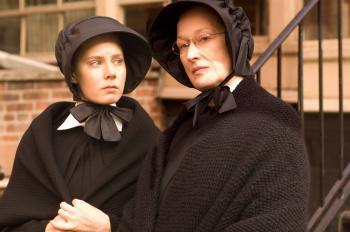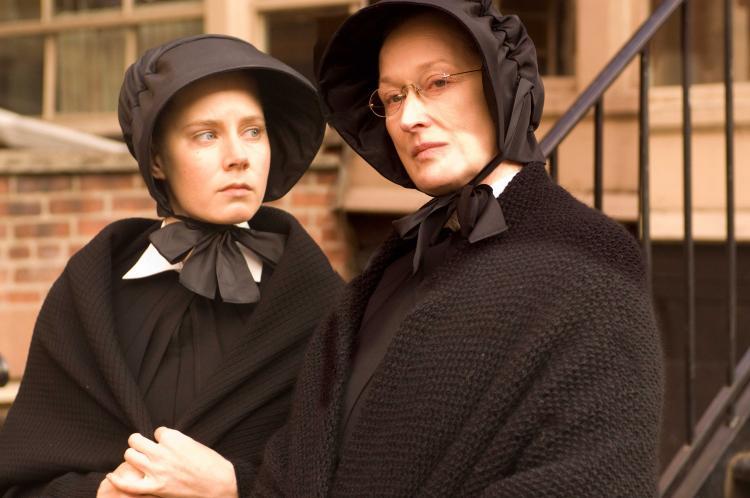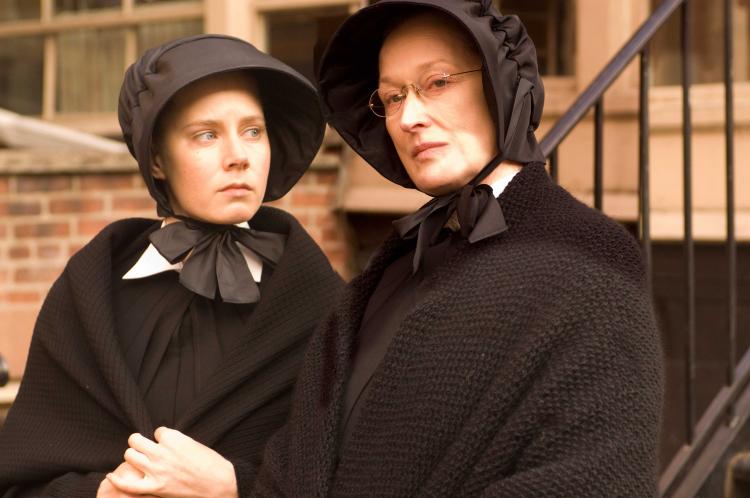John Patrick Shanley adapts his own Pulitzer Prize winning play with this big screen version of morose sister act scandal chaser, Doubt.
Set in 1964, it centres on Sister Aloysius Beauvier (Meryl Streep), a St Nicholas Parish nun who confronts her superior, Father Flynn (Phillip Seymour Hoffman) about his supposed indecent intentions towards a young choir boy. Without a shred of evidence she sets off on a personal crusade based on intuition alone – “I know people” – along the way manipulating timid Sister James (Amy Adams) into testimony and locking horns in a battle of wills and morality.
There is no doubt that, erm, Doubt features some stellar turns. The fact that it struggles, or doesn’t attempt to escape its Broadway origins with simple sets and very limited scope means the actors are always at the forefront. The perennially brilliant Hoffman is superbly charismatic as the under-fire priest, and Meryl Streep’s transformation from acid-tongued principal to scattershot investigator could be her finest hour.
The real revelation is Adams, seemingly transferring her innocent Junebug performance into a shuffling habit, it’s only when the cracks begin appearing in her well worn sanity that the awards gossip is justified.
Despite the trio of sparkling performances a recommendation is hardly a given. The direction is executed with a steady hand, only the odd flurry of wind as Streep starts to question her motives signal any extravagance. We could certainly do without the claps of thunder as Hoffman and Streep exchange retorts though, but it’s another signifier of the film’s theatrical origins.
The subject itself is intriguing without ever being exploited for controversy, but not one that hasn’t been touched on before in the likes of Primal Fear, Sleepers and the odd Sunday night TV drama. The real joy lies in switching allegiances between Father Flynn and Sister Beauvier; as they play cat and mouse so does the audience, intently focused on Shanley’s excellent wordplay.
Doubt’s major fault may be that Shanley didn’t step away from material he is so familiar with. The only aspects that truly sparkle are the dialogue driven performances, and in the hands of an accomplished director this may have been a great film instead of merely a good one.
[etRating value=“ 3”]
Set in 1964, it centres on Sister Aloysius Beauvier (Meryl Streep), a St Nicholas Parish nun who confronts her superior, Father Flynn (Phillip Seymour Hoffman) about his supposed indecent intentions towards a young choir boy. Without a shred of evidence she sets off on a personal crusade based on intuition alone – “I know people” – along the way manipulating timid Sister James (Amy Adams) into testimony and locking horns in a battle of wills and morality.
There is no doubt that, erm, Doubt features some stellar turns. The fact that it struggles, or doesn’t attempt to escape its Broadway origins with simple sets and very limited scope means the actors are always at the forefront. The perennially brilliant Hoffman is superbly charismatic as the under-fire priest, and Meryl Streep’s transformation from acid-tongued principal to scattershot investigator could be her finest hour.
The real revelation is Adams, seemingly transferring her innocent Junebug performance into a shuffling habit, it’s only when the cracks begin appearing in her well worn sanity that the awards gossip is justified.
Despite the trio of sparkling performances a recommendation is hardly a given. The direction is executed with a steady hand, only the odd flurry of wind as Streep starts to question her motives signal any extravagance. We could certainly do without the claps of thunder as Hoffman and Streep exchange retorts though, but it’s another signifier of the film’s theatrical origins.
The subject itself is intriguing without ever being exploited for controversy, but not one that hasn’t been touched on before in the likes of Primal Fear, Sleepers and the odd Sunday night TV drama. The real joy lies in switching allegiances between Father Flynn and Sister Beauvier; as they play cat and mouse so does the audience, intently focused on Shanley’s excellent wordplay.
Doubt’s major fault may be that Shanley didn’t step away from material he is so familiar with. The only aspects that truly sparkle are the dialogue driven performances, and in the hands of an accomplished director this may have been a great film instead of merely a good one.
[etRating value=“ 3”]






